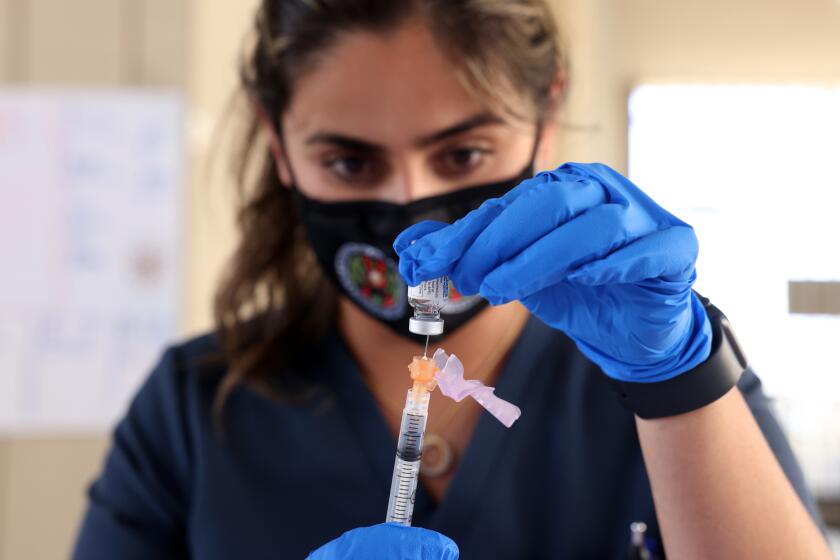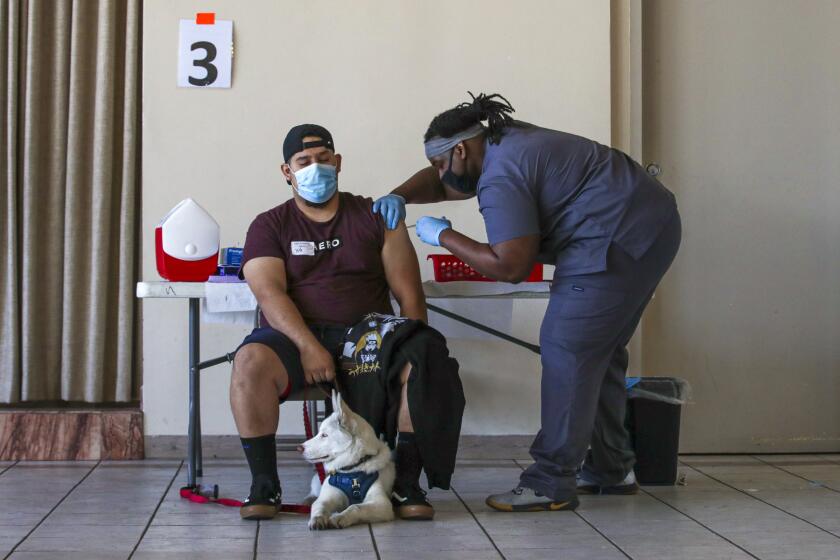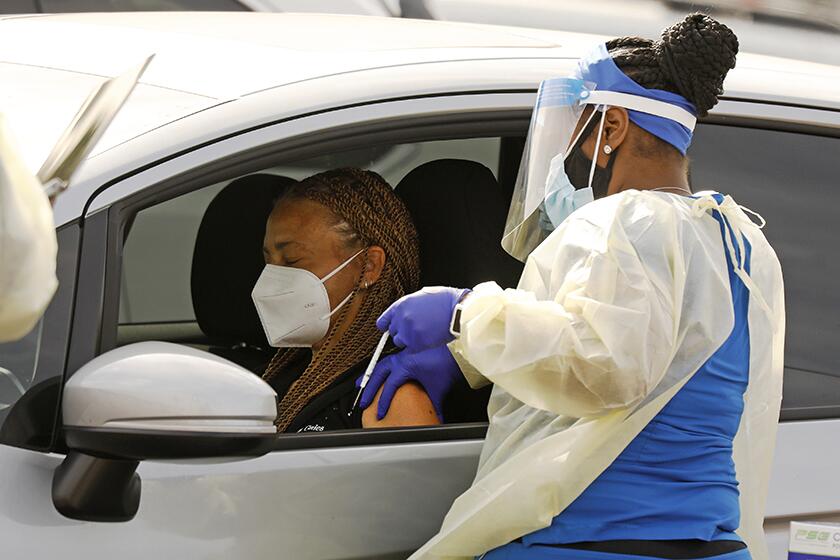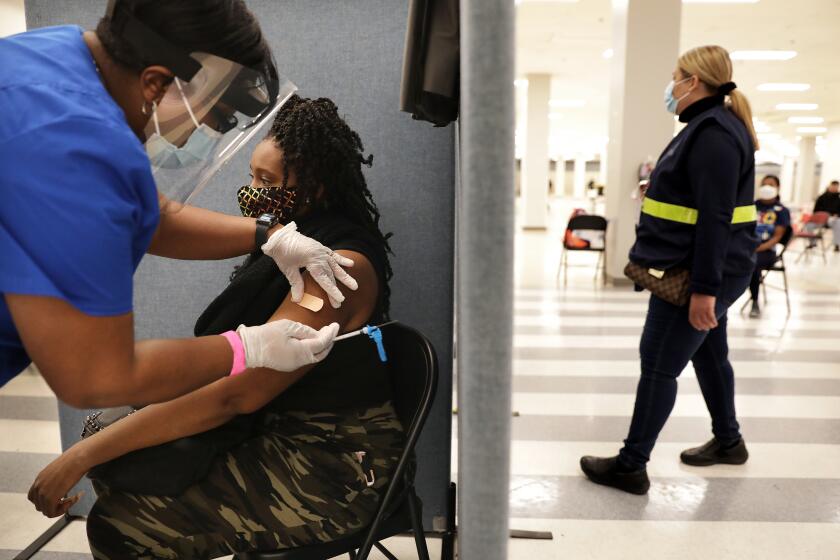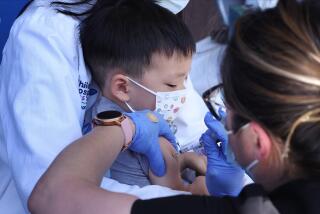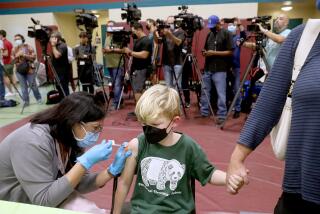Vaccination appointments now open to all 16 and older in California
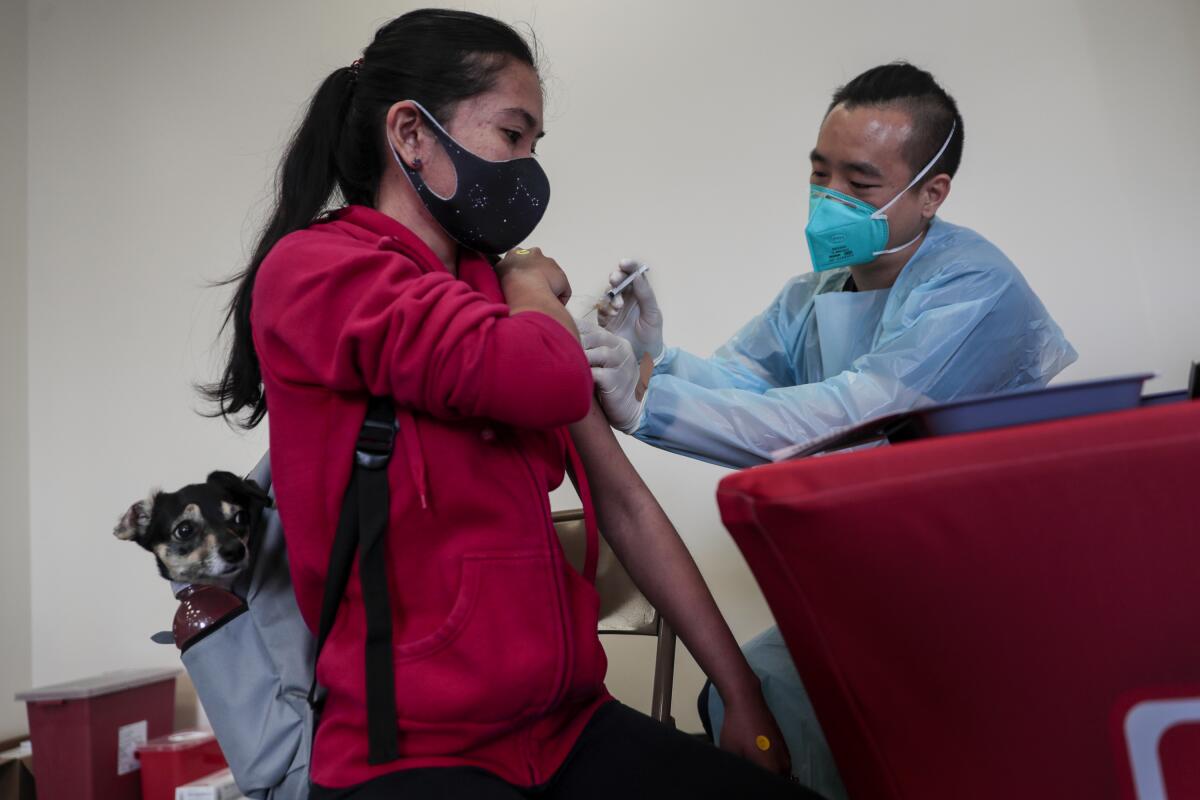
- Share via
Everyone in California 16 and older can now book COVID-19 vaccine appointments on the state’s My Turn appointment system. The changes to the system went into effect Wednesday night.
In Southern California, residents of Orange and Ventura counties ages 16 and up became newly eligible to book vaccine appointments through My Turn. Los Angeles, San Diego, Riverside, San Bernardino, Santa Barbara, San Luis Obispo and Imperial counties had already made everyone 16 and older eligible.
Men are more likely to die from COVID-19, but less likely to get vaccinated. The gender gap troubles public health experts.
My Turn officials said the online system can handle up to 300,000 transactions per hour, and that they expect it to handle demand.
Officials released a new version of the My Turn website Wednesday night with the new eligibility and are in the process of adding language support for the first time in Arabic and Persian. People can also make appointments by phone at (833) 422-4255, with language support for more than 200 languages.
Authorities have counseled patience for residents seeking appointments, suggesting it will take awhile for everyone who wants a vaccine appointment to get one.
The My Turn website is an attempt by the state to produce a main gateway to find and schedule appointments, but sometimes, not all available appointments show up in the My Turn system. Alternate ways to book appointments include through healthcare providers, such as Kaiser, and pharmacies that offer vaccines, such as CVS, Ralphs, Rite Aid, Walgreens, Costco, and Albertsons/Vons/Safeway/Pavilions; some of those vaccine providers also expanded eligibility to book appointments on Wednesday night, too.
The city of Los Angeles has a separate vaccine appointment portal, operated by Carbon Health, that is not integrated into the My Turn system.
All vaccines are free to everyone living in the U.S., regardless of immigration or health insurance status.
Officials were optimistic that the vaccine rollout will not be affected too much by the recommended national pause on distribution of the Johnson & Johnson vaccine.
With coronavirus cases and related hospitalizations climbing nationwide, is California also headed for a fourth wave in the COVID-19 pandemic?
California state epidemiologist Dr. Erica Pan said less than 4% of California’s vaccine allocation from the federal government this week — 67,600 out of roughly 2 million doses — is from Johnson & Johnson. Moderna and Pfizer continue to make up the majority.
Nearly 24 million doses have been administered throughout the state, and nearly 29% of residents have been fully vaccinated. While the state opens eligibility to all residents 16 and over on Thursday, many in that age range have already received a shot. In L.A. County, where nearly 2 million residents have been fully vaccinated, about 1.5 million residents ages 16 to 49 have received at least one dose. That’s more than a third of that subset.
Of the 19,600 Johnson & Johnson vaccine appointments that were scheduled this week in Los Angeles County, Public Health Director Barbara Ferrer said that roughly 13,670 have been rebooked for Pfizer-BioNtech or Moderna appointments.
The pause, however, has affected several mobile teams in the county, who often vaccinate people during single-day events. The single-shot dose has been key to the state’s distribution strategy to reach communities hardest hit by COVID-19, as well as residents who are hesitant, less mobile or disabled.
The pause on the Johnson & Johnson vaccine was recommended as federal officials investigate six cases involving women aged 18 to 48 who developed a rare blood clot between six and 13 days after receiving the vaccine. One death has been reported.
California and Los Angeles officials say they don’t expect the Johnson & Johnson stoppage will make it harder right away to get a COVID vaccine.
Of the more than 194 million COVID-19 vaccine doses administered nationally, just over 7 million have been of the Johnson & Johnson shot. More than 100 million Pfizer doses have been administered, and more than 86 million of the Moderna shot.
The presentation of the blood clots reported is particularly rare — involving not only a blood clot that prevents blood from draining out of the brain, known as cerebral venous sinus thrombosis (CVST), but occurring in combination with low level of blood platelets, known as thrombocytopenia. The reports are similar to rare reports of blood clots seen in Europe after vaccination with the AstraZeneca vaccine, which has not been approved in the U.S.
Officials said one reason to issue the pause was to notify hospitals to be alert about this rare type of complication. A more common blood clot would normally be treated by a blood-thinning drug called heparin, but using heparin to treat the rare blood clot disclosed Tuesday might be dangerous. Alternative treatments would need to be given, preferably by a doctor experienced in treating blood clots.
Doctors, if they encounter people with low blood platelets or if they see people who have blood clots, need to inquire about a history of recent vaccination, “and then act accordingly in the diagnosis and management of those individuals,” Dr. Peter Marks, director of the Food and Drug Administration’s Center for Biologics Evaluation and Research, said this week.
Anyone who received the Johnson & Johnson vaccine more than a month ago has an exceptionally low risk of developing this kind of blood clot. For those who received the vaccine in the last few weeks, getting such a clot is also believed to be extremely rare, Dr. Rochelle Walensky, the director of the U.S. Centers for Disease Control and Prevention, said Wednesday.
Symptoms of this kind of rare blood clot include severe headache, leg pain, abdominal pain or shortness of breath. They necessitate a visit to the emergency room.
The Johnson & Johnson and AstraZeneca vaccines use a similar method to induce an immune response to the coronavirus. One possible reason behind the rare clots might be related to the vaccine producing an immune response that leads to blood platelets being activated, resulting in blood clots, Marks said.
The other two approved vaccines in the U.S., produced by Pfizer and Moderna, use a different method to produce an immune response. “We are not seeing these events with the other two vaccines — with Pfizer and Moderna,” Walensky said.
“We believe these events to be extremely rare, but we are also not yet certain we have heard about all possible cases, as this syndrome may not be easily recognized as one associated with the vaccine,” Walensky said. “CDC and FDA are working rapidly to investigate each case and understand whether there is a causal relationship between these blood clots and vaccine administration.”
Reports of blood clots among those who got Johnson & Johnson’s COVID-19 vaccine may make some recipients anxious. Here’s how to handle those feelings.
The CDC’s Advisory Committee on Immunization Practices (ACIP) had an emergency meeting Wednesday to discuss the vaccine, but did not vote on any new recommendations. Citing a need for more data, the committee will likely meet again in seven to 10 days.
“We are committed to following the science and ensuring complete transparency as we pursue this investigation. As our promise, we are going to tell you what we know when we know it,” Walensky said.
California’s cumulative COVID-19 death toll topped 60,000 this week. It has exceeded 560,000 nationally. More than 700 COVID-19 deaths have been reported daily, on average, in the U.S. over the past week, up 7% from the previous week.
More to Read
Sign up for Essential California
The most important California stories and recommendations in your inbox every morning.
You may occasionally receive promotional content from the Los Angeles Times.
